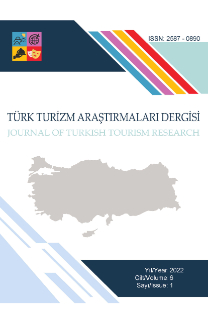Türk Devletlerinin Turizm Rekabetçilik Performansının Homojenlik Analizi
The Homogeneity Analysis of Tourism Competitiveness Performance of Turkish States
___
- Aschauer, W. (2014). New Approaches in The Research on Terrorist Attacks Affecting Tourism Demand, (Editor) Andrews, H.: Tourism and Violence incl. (165-186) New York: Routledge.
- Bahar, O. ve Kozak, M. (2012). Turizm ve Rekabet, Ankara: Detay Yayın.
- Carrion, C. J. (2016). Why Azerbaijan Needs A Strategic Reform of Its Foreign Policy Towards The European Union?, Center for Economic and Social Development, Baku.
- Chandra, S. and Menezes, D. (2001). Applications of multivariate analysis in international tourism research: The marketing strategy perspective of NTOs, Journal of Economic and Social Research, 3 (1): 77–98.
- Çoban, O. (2001). Teknolojik Gelişme ve Rekabet Gücü. Verimlilik Dergisi, 4, 32.
- Crouch, G. I. and Ritchie, J. B. (2000). The Competitive Destination: A Sustainability Perspective, Tourism management, 21(1): 1-7.
- Dwyer, L. and Kim, C. W. (2003). Destination Competitiveness: Determinants and Indicators, Current Issues in Tourism, 6(5): 369-414.
- Ersun, N. ve Arslan, K. (2011). Turizmde Destinasyon Seçimini Etkileyen Temel Unsurlar ve Pazarlama Stratejileri, MU Iktisadi ve Idari Bilimler Dergisi, 31 (2), 229-248.
- Evans, N., Stonehouse, G. and Campbell, D. (2003). Strategic Management for Travel and Tourism. Amsterdam: Butterworth-Heinemann.
- Hassan, S. S. (2000). Determinants of market competitiveness in an environmentally sustainable tourism industry, Journal of Travel Research, 38(3), 239-245.
- Kantarci, K. (2007). Perceptions of Foreign Investors on the Tourism Market in Central Asia Including Kyrgyzstan, Kazakhstan, Uzbekistan, Turkmenistan, Tourism Management, 28, 820-829.
- Mazanec, J. A. and Ring, A. (2011). Tourism Destination Competitiveness: Second Thoughts on The World Economic Forum Reports, Tourism Economics, 17 (4), 725-751.
- Navickas, V. and Malakauskaite, A. (2009). The Possibilities for The Identification and Evaluation of Tourism Sector Competitiveness Factors, Engineering Economics, 1, 37–44.
- Sarıkaya, S. (2006). Sürdürülebilir Rekabet Avantajı, (Editör) Eraslan, H. ve Şelli, F.: Sürdürülebilir Rekabet Avantajı Elde Etmede Organik Tarım Sektörü : Sektörel Stratejiler ve Uygulamalar içinde (ss. 851-864) İstanbul, Uluslararası Rekabet Araştırmaları Kurumu Derneği (URAK).
- Scheyvens, R. (2007). Exploring the Tourism-Poverty Nexus, Current Issues in Tourism, 10(2-3): 231-234.
- WEF (World Economic Forum). (2017a). Global Competitiveness Report 2017-2018. [Online] https://www.weforum.org/reports/the-global-competitiveness-report-2017-2018 , [Erişim Tarihi: 24.04.2018]
- WEF (World Economic Forum). (2017b). The Travel &Tourism Competitiveness Report 2017. [Online] http://www3.weforum.org/docs/WEF_TTCR_2017_web_0401.pdf , [Erişim Tarihi: 24.04.2018]
- Theobald, W. (2006). The Meaning, Scope, and Measurement of Travel and Tourism, (Editor) Theobald, W.: Global Tourism incl. (pp. 5-25) Amsterdam, Butterworth-Heinmann.
- UNWTO. (2017). Tourism Highlights 2017 Edition, World Tourism Organization, Madrid.
- Veal, A. J. (2011). Research Methods for Leisure & Tourism. United Kingdom: Harlow.
- Webster, C. and Ivanov, S. (2014). Transforming competitiveness into economic benefits: Does tourism stimulate economic growth in more competitive destinations? Tourism Management, 40, 137-140.
- World Travel and Tourism Council (WTTC). (2017). Travel and tourism: Global economic impact and issues, 2017.
- www.britannica.com/topic/Turkic-peoples [Erişim Tarihi: 21.05.2018].
- ISSN: 2587-0890
- Yayın Aralığı: Yılda 4 Sayı
- Başlangıç: 2017
- Yayıncı: Prof. Dr. Yüksel ÖZTÜRK
Restoran Müşterilerinin Personel İletişim Düzeyi Algıları ve Memnuniyetleri Arasındaki İlişki
OZAN BÜYÜKYILMAZ, ÖMER CEYHUN APAK
Turizm Endüstrisinde Blogların Gücü ve Turist Rehberleri Açısından Bir Değerlendirme
Mithat Zeki DİNÇER, TOLGA FAHRİ ÇAKMAK, MERVE AYDOĞAN ÇİFÇİ
SALİH KUŞLUVAN, Olcay YÜCEL, Karel Van ISACKER, António Silva DIAS, Petia GRUDEVA, Filip NICASI, Zdenka WLTAVSKY
SERCAN YILDIZ, LEVENT SELMAN GÖKTAŞ, Tuncay HABİL, F. Füsun İSTANBULLU DİNÇER
Türk Devletlerinin Turizm Rekabetçilik Performansının Homojenlik Analizi
Orkhan ALİLİ, İsmail KIZILIRMAK
Konfor Gıda Tüketimi: Mersin’den Örnekler
Serpil YALIM KAYA, Neslihan ŞİMŞEK, Celil ÇAKICI
Türk Dünyası’nın Tanıtımında “Modern İpek Yolu Ortak Tur Paketi”
